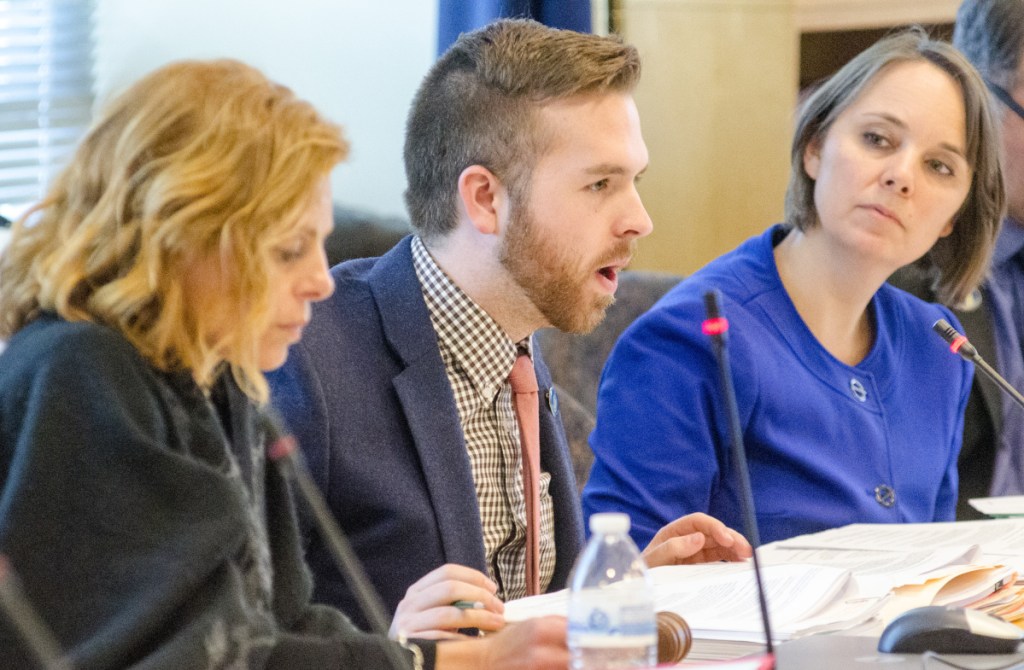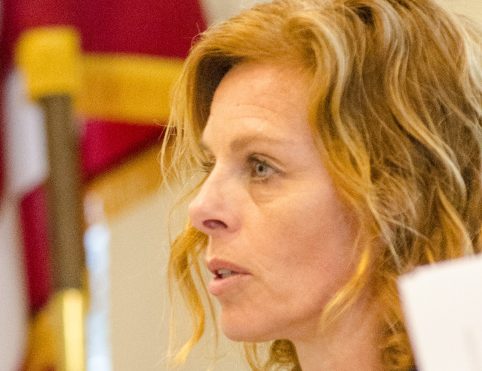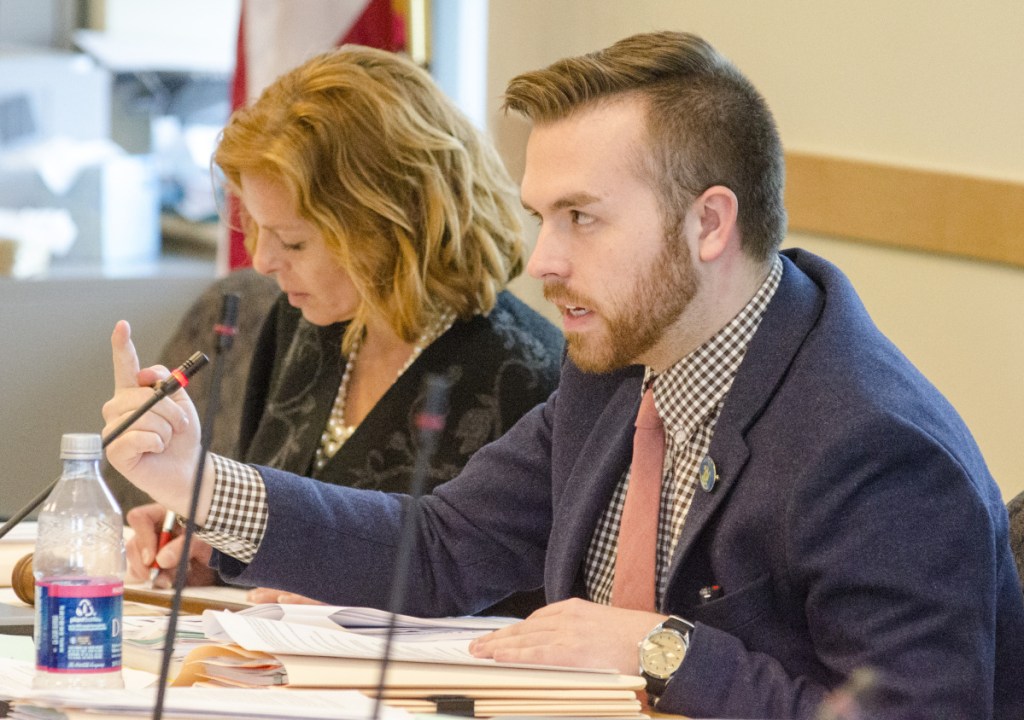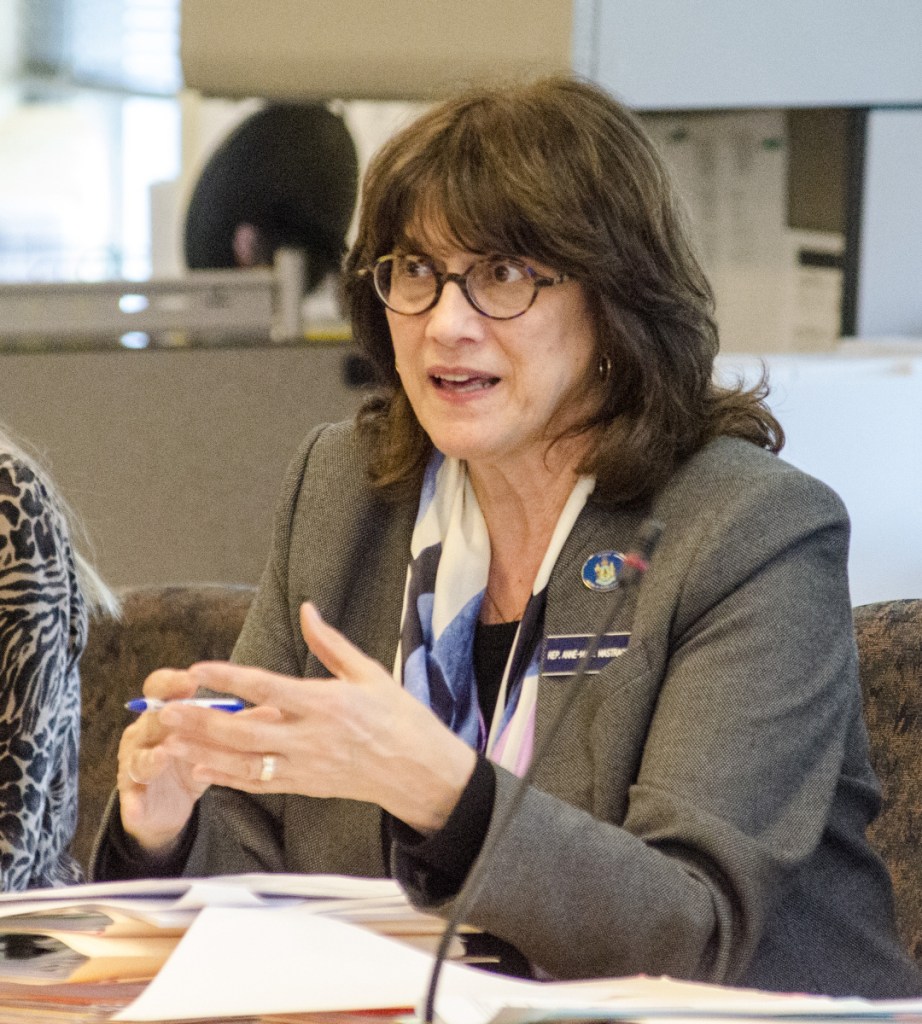AUGUSTA — Mainers from across the state on Wednesday joined in a town-hall-style conference call, in which they berated the state’s recently unveiled filing system for unemployment benefits.
The tele-town hall conference call comes a day after a legislative committee initially deadlocked on reporting out a bill to the House but on Wednesday reached a majority that contained a provision allowing claimants to file their work search histories by phone or in person, a step in the claims process that had befuddled many and left them without benefits.
During the call, which was hosted by Sen. Shenna Bellows, D-Manchester, and Rep. Ryan Fecteau, D-Biddeford, a number of Mainers called in either with questions about the system or personal stories of how they thought the system had failed them. Bellows said she and Fecteau had heard “countless complaints” privately. She said the point of such a conference call was to continue to put pressure on the Maine Department of Labor to make changes and fix the system.
Fecteau echoed those comments, saying the new system isn’t working. He said they are constantly hearing that claimants are spending an unreasonable amount of time on hold on the phone trying to reach someone at the department, so much so they aren’t able to search for work.
“I think the system was rolled out prematurely, and there were too many flaws prior to the rollout which resulted in the backlash we’re experiencing now where folks are having trouble accessing benefits or even filing a claim,” Fecteau said.
It’s not clear exactly how many people called into the tele-town hall conference call, but those who did call in were able to ask the legislators questions as well as respond to questions.
One caller named Cory said he was a construction worker who regularly experiences seasonal unemployment, and he is currently unemployed. He said it shouldn’t be so hard to contact someone at the department when he needs help. He said the new system has a different way to record the benefit year. Fecteau said under the previous system, a year was a 12-month period. With the new system, it’s based on a strict calender beginning in January and ending in December. So for Cory, Fecteau said he could begin a claim in December but would have to then re-register in January.
“That’s been a big problem for us,” Fecteau said.
A caller named Julie said a friend of hers had a poor experience with the labor department. She said her friend works as a traveling nurse for a Maine company and had to leave her job to take care of her adult son. Julie said her friend was told by the department she had to file for unemployment with the state she was last working in, despite working for a Maine company.
“We want to intervene on behalf of people like your friend,” Bellows said.
Bellows said this “breaks my heart,” since it was a Maine resident working for a Maine company being put at a disadvantage by the new system.
The tele-town hall was put together with the State Innovation Exchange, a progressive organization that helps legislators advance their policies. Fecteau said the organization helped put together the tele-town hall and polled parts of the state to find those affected by the system to call in. At its peak, there were about 800 people on the line, and while participation declined toward the end of the hourlong call, he said they likely maintained an average of about 500.
The bill before the committee, L.D. 1770, is largely about housekeeping updates to the language in the law. Included in the bill reported out of committee is the requirement that the department allow claimants to file their work search histories by phone or in person. The new system permits claimants to file the work search only online, which can be problematic for Mainers living in rural areas without access to computers, or older residents who can’t use computers. Bellows said she met with the department, and this was a good compromise. Previously, the state had allowed claimants to file their work search on paper, but the department did not want to continue with that.
“We’re trying to accommodate the department,” Bellows said. “I think the paper system was working well.”
Unlike last week’s meeting with the state’s Committee on Labor, Commerce, Research and Economic Development, members of the Department of Labor did appear to address concerns and answer questions during the March 6 meeting, which ran well into the night.
The state, for its part, largely has maintained that the new system, a consortium effort with three other states known as ReEmployUSA, has been running as expected, with the usual hiccups along the way that any major system overhaul should expect. However, legislators have maintained that the new system was rushed out, poorly thought out and has left countless Mainers in need.
Rep. James Handy, D-Lewiston, expressed his concerns that constituents can’t leave voice mail messages with the department’s Bureau of Unemployment Compensation and recently heard from a constituent who waited on the phone for hours, only to be disconnected.
The ReEmployUSA system was spearheaded by Mississippi in what eventually became the four-state consortium, a cloud-based filing system that Maine is a part of, along with Rhode Island and Connecticut. Maine’s program is called ReEmployME, while Mississippi’s is AccessMS. Connecticut and Rhode Island have not rolled out their versions yet.
Addressing Handy, Kerry Gross, the bureau’s director of employee services, said that several times in the past week the phone lines were not busy, and that no calls were in the queue. Addressing Handy’s question as to whether claimants can leave a voice mail to show they were trying to reach the department, Gross indicated claimants would have to travel to their nearest career center, which apparently have specialists and phone lines where they can reach claims representatives.
Bellows expressed her previous concerns about the system’s ability to handle the expected influx of claimants coming when thawing roads are posted and the logging season ends. In terms of the open lines Gross mentioned before the panel, Bellows asked if the department was bracing for the possibility of another big wave of people trying to file. Gross said she could not answer that.
“There’s still a serious problem over there, and I’m getting to my wits’ end,” Handy said. He then read a letter from a constituent who had been unable to access her benefits for four weeks. In the note, the author wrote the department was “making it purposefully difficult” for people to file for their benefits. “I hope someone takes that to heart.”
Laura Hudson, spokesperson for the labor department, said the department already has met with the state’s loggers association to prepare for those workers when they hit their seasonal unemployment. She said the department will have roving unemployment insurance representatives in that time going to career centers and bringing extra computers. They also will look at hiring temporary staffers to help during that time and will take work searches over the phone.
“We’re trying to be a little more proactive,” she said.
Fecteau said that while he was happy to hear the department was being proactive, he wanted to know if the department could bring back a way for claimants to leave voice mail messages on the technical line. Hudson said the line wasn’t taken down. She also said it was “news to me” that the voice mail line for the technician line had been taken down.
Bellows said when the technician line’s temporary workers were let go, the voice mail component was terminated. Hudson said there were six to eight workers who helped claimants get signed up and assisted with password resets. When Bellows asked Hudson if the department was willing to explore putting the voice mail component back into use, Hudson said they would.
Rep. Karen Vachon, R-Scarborough, said she likened the rollout of this system to when the Obama administration rolled out healthcare.gov. She said with that system, people can’t leave messages either, and there are often long hold times.
“I hate that piece of it, but it exists,” she said.
Vachon said that while the constituent Handy had mentioned did have issues, it was likely because that person struggled with computers. She said going to career centers and learning the system would provide valuable experience for those who are out of work.
After Democrats took a brief caucus, Bellows reiterated she was “deeply concerned” with the idea of the new system for the employer side, having heard that during the testing process for it, multiple errors were discovered. However, she said the system was still moved forward “because of artificial time constraints.” She urged the department not to move forward until they were fully ready.
At the Feb. 9 hearing, BUC Director John Feeney said the system’s launch was timed to accommodate another new system going into place in August, one designed for employers who contribute their required share to the unemployment insurance system.
Two reports were presented to the committee on Tuesday, Fecteau said, one containing language introduced by Bellows and the other language backed by Sen. Amy Volk, R-Scarborough, the co-chairwoman of the committee, on how benefits are charged to employers.
Under the current system, if an employee is laid off after working less than five weeks for an employer, the responsibility of paying a claim shifts to the most recent employer of more than five weeks.
Bellows wanted language that called for charging the most recent employer. Volk backed the language the department wanted which calls for all past employers within a given time to be charged proportionally. Fecteau said this could put unfair burdens on an employer that an employee left of his or her own free will, versus the latest employer from which the employee was laid off.
Changes do not go into effect until 2020, per the bill, to allow for programming. In the meantime, the state would continue using the existing system.
The committee ultimately gave the Bellows version the majority by a 7-5 margin, while the Volk version will be presented to the House as the minority report.
Colin Ellis — 861-9253
cellis@centralmaine.com
Twitter: @colinoellis
Copy the Story Link
Send questions/comments to the editors.






Success. Please wait for the page to reload. If the page does not reload within 5 seconds, please refresh the page.
Enter your email and password to access comments.
Hi, to comment on stories you must . This profile is in addition to your subscription and website login.
Already have a commenting profile? .
Invalid username/password.
Please check your email to confirm and complete your registration.
Only subscribers are eligible to post comments. Please subscribe or login first for digital access. Here’s why.
Use the form below to reset your password. When you've submitted your account email, we will send an email with a reset code.